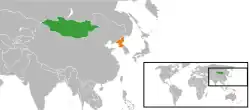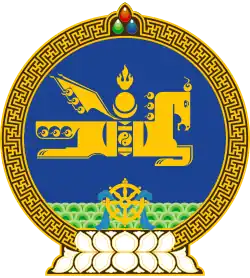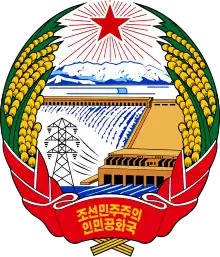 | |
Mongolia |
North Korea |
|---|---|
Mongolia–North Korea relations (Mongolian: Монгол, БНАСАУ-ын харилцаа, Korean: 몽골-조선민주주의인민공화국 관계) are the historic and current bilateral relations between Mongolia and the Democratic People's Republic of Korea (North Korea).
History
Early relationship and Korean War
The two countries established diplomatic relations on October 15, 1948. The People's Republic of Mongolia was the second country to recognize North Korea after the Soviet Union.[1] Mongolia provided assistance to North Korea during the Korean War, although it did not directly participate. In 1952, during the Korean War, North Korea sent 200 war orphans to Mongolia. Today in Ulaanbaatar, there are remnants of a two-story "North Korean War Orphanage" building remains.[2] Mongolia also contributed to the post-war reconstruction of the DPRK. On the basis of an aid agreement signed at the end of 1953, the Mongolian government sent 10,000 horses to North Korea.[3] After the war, Mongolia received and brought up more than 400 war-orphaned children in 1960–1970s.[4]
Cold War
From 1960 to the mid-1980s, the Sino-Soviet split – in which Mongolia adopted a consistently pro-Soviet stance, whereas the DPRK's standpoint was usually closer to the Chinese position than to the Soviet one – considerably hindered Mongolian-North Korean cooperation. On several occasions, these disagreements led to various forms of low-intensity friction in Mongolian-DPRK relations.[5] Thanks to the post-1982 improvement of Sino-Soviet relations, in 1986 Mongolia and North Korea signed their first friendship and cooperation treaty.[6][4] Kim Il Sung also paid a visit to the country in 1988.[7]
Post-1990
After the collapse of the Communist regime in Mongolia, relations became strained. The two countries nullified their earlier friendship and cooperation treaty in 1995, and in 1999, North Korea shut down their embassy in Ulaanbaatar on the occasion of an official visit from Kim Dae-jung, the first such visit by a South Korean president.[6] Mongolia had previously expelled two North Korean diplomats for attempting to pass counterfeit United States one-hundred dollar bills.[8][9] Subsequently, Mongolia began to intensify its policy of engagement with North Korea, with the aim of improving relations.[10] In 2002, Paek Nam Sun became the first North Korean foreign minister to visit Mongolia in 14 years.[6] The most recent high-level visit occurred in July 2007, when Kim Yong-nam, Chairman of the Presidium of the Supreme People's Assembly, made his third visit to the country; he had previously made two trips to Mongolia, in 1985 and 1988.[7]
Unofficially, North Korean visitors show significant interest in studying Mongolia's economic reforms; according to the Mongolian side, North Koreans see them as non-threatening because they are a fellow non-Western country and went through similar experiences under communism.[11] Mongolia's efforts to introduce free-market capitalism to North Korea also have a component of self-interest. The Trans-Siberian Railway, an essential link in the potential continuous rail transit route from South Korea to Europe, passes through Mongolia; North Korean economic liberalisation which allowed South Korean shipping to pass through its borders would remove the major stumbling block to such a route, providing economic benefits for Mongolia.[12]
North Korean refugees are a delicate issue between the two governments. In 2005, South Korean charity groups received from the Mongolian government an allocation of 1.3 square kilometres of land at an unspecified location 40 kilometres outside of Ulan Bator to establish a refugee camp.[13] However, as of November 2006, Miyeegombyn Enkhbold, Mongolia's prime minister, officially denied the existence of such camps. One scholar estimated that 500 North Korean refugees enter Mongolia each month, along with some legal migrant labourers who come under an inter-governmental agreement to work in light industry and infrastructure projects.[14]
In 2013, the Mongolian President Tsakhiagiin Elbegdorj visited North Korea, and the two countries expanded economic ties, particularly with regard to oil refining.[15][16] In October 2018, North Korean Chairman Kim Jong Un received an official invitation to pay a visit to Mongolia by President Khaltmaagiin Battulga.[17]
Inter-nation visits
Heads of State and Government[4]
| Guest | Host | Place of visit | Date of visit |
|---|---|---|---|
| Pyongyang | 1956[4] | ||
| Ulaanbaatar | 16-18 July 1956[18][19][20][21][22] | ||
| Ulaanbaatar | 1985 | ||
| Pyongyang | 1986 | ||
| Ulaanbaatar | 1988 | ||
| Ulaanbaatar | 1985 | ||
| Pyongyang | 1999 | ||
| Pyongyang | 2003 | ||
| Pyongyang | 2004 | ||
| Pyongyang | 2013 |
Lower ranking officials[1]
| Guest | Host | Place of visit | Date of visit | Description of visit |
|---|---|---|---|---|
| Ulaanbaatar | 14 July 1971 | Visit during the celebrations of the 50th anniversary of the People's Revolution.[23] | ||
| Ulaanbaatar | 1973 | |||
| Pyongyang | 21 December 1974 | [24] | ||
| Pyongyang | 1989 | [1] |
Diplomatic missions
North Korean ambassadors to Mongolia
Mongolian ambassadors to North Korea
- Jamsran Sambuu (1950–1952)
- Batyn Dorj (1961–1963)
- Sharavyn Gungaadorj (1992–1997)
- Janchivdorjyn Lomvo (2001–2008)[27]
- Sodovjamts Khurelbaatar (2008–2011)[28]
- Manibadrakh Ganbold (2012–2016)[29]
- Surengiin Tsoggerel (2016–)[30]
See also
References
- 1 2 3 "Д.Бямбаа: БНАСАУ-ыг хүлээн зөвшөөрч, дипломат харилцаа тогтоосон хоёр дахь орон нь Монгол". MONTSAME News Agency. Retrieved 2021-06-21.
- ↑ 수정 2010.03.28 13:00, 입력 2010 03 28 12:39 (2010-03-28). "[박보균의 세상 탐사] 몽골 속 북한의 기이함". 중앙일보 (in Korean). Retrieved 2021-06-21.
{{cite web}}: CS1 maint: numeric names: authors list (link) - ↑ Balázs Szalontai, Kim Il Sung in the Khrushchev Era: Soviet-DPRK Relations and the Roots of North Korean Despotism, 1953-1964 (Stanford: Stanford University Press; Washington, D.C.: Woodrow Wilson Center Press, 2005), pp. 46-47.
- 1 2 3 4 "Монгол улс, БНАСАУ-ын харилцааны 70 жил". www.baabar.mn | Шилдэг нийтлэлчдийн клуб. Retrieved 2021-06-21.
- ↑ On a DPRK-provoked incident in 1976, see Balázs Szalontai, “Expulsion for a Mistranslated Poem: The Diplomatic Aspects of North Korean Cultural Policies.” In: Vu Tuong and Wasana Wongsurawat, eds., Dynamics of the Cold War in Asia: Ideology, Identity, and Culture (New York: Palgrave Macmillan, 2009), pp. 157-159.
- 1 2 3 "Mongolia, N. Korea sign friendship treaty". Kyodo. 12 August 2002. Archived from the original on 26 October 2007. Retrieved 2007-08-22.
- 1 2 Ch., Sumiyabazar (20 July 2007). "North Korean Kim visits Mongolia". The UB Post. Archived from the original on 12 August 2007. Retrieved 2007-08-22.
- ↑ Foster-Carter, Aidan (16 June 2001). "Pyongyang Watch". Asia Times. Archived from the original on 25 July 2001. Retrieved 2007-08-22.
{{cite news}}: CS1 maint: unfit URL (link) - ↑ Halbertsma, Tjalling H. F. “Mongolia and the DPRK at Sixty-Five: Ulaanbaatar's Changing Relations with Pyongyang.” North Korean Review, vol. 10, no. 2, 2014, pp. 23–38., doi:10.3172/nkr.10.2.23.
- ↑ Batchimeg, Migeddorj (March–April 2006). "Mongolia's DPRK Policy: Engaging North Korea". Asian Survey. 46 (2): 275–297. doi:10.1525/as.2006.46.2.275. Archived from the original on 2011-07-24. Retrieved 2007-08-22.
- ↑ Pocha, Jehangir (12 December 2004). "A surprising sphere of influence: Ancient ties may be key to N. Korea". The Boston Globe. Retrieved 2007-08-22.
- ↑ Pocha, Jehangir (18 March 2005). "A softer approach to North Korea: Mongolia offers itself as a model for change". International Herald Tribune. Retrieved 2007-08-22.
- ↑ Lee, Wonhee (6 September 2005). "Center Offers Haven For North Korean Defectors in Mongolia". Radio Free Asia. Archived from the original on 3 October 2006. Retrieved 22 August 2007.
- ↑ "Mongolia not planning camps for North Korea". Gulf Times, Qatar. 24 November 2006. Archived from the original on 30 September 2007. Retrieved 2007-08-22.
- ↑ What Do North Korea And Mongolia Have In Common? — The Diplomat
- ↑ Mongolia’s special relationship with North Korea pays economic dividends | Mongolia | The Guardian
- ↑ "Kim Jong Un, Mongolian president exchange messages on revolution's anniversary". UPI. Retrieved 2021-06-21.
- ↑ "Ким Ир Сен Монгол Улсад айлчилсны 60 жилийн ойг тэмдэглэв". MONTSAME News Agency. Retrieved 2021-06-21.
- ↑ Holstine, Jon D. (January 16, 2015). Recent Outer Mongolian International Relations: A Time Capsule. Lulu Press, Inc. ISBN 9781312670143 – via Google Books.
- ↑ "Mongolian President invites Kim Jong Un to Ulaanbaatar | NK News". October 15, 2018.
- ↑ "Mission of Friendship: Friendly Visit of the D.P.R.K. Government Delegation to the U.S.S.R. and Other Fraternal People's Democracies". Foreign Languages Publishing House. November 27, 1956 – via Google Books.
- ↑ Kim, Cheehyung Harrison (2018-11-06). Heroes and Toilers: Work as Life in Postwar North Korea, 1953–1961. Columbia University Press. ISBN 978-0-231-54609-6.
- ↑ "Wilson Center Digital Archive".
- ↑ "Wilson Center Digital Archive". digitalarchive.wilsoncenter.org. Retrieved 2021-06-29.
- ↑ "The Ambassador of North Korea Presents Letter of Credence to president Elbegdorj | President of Mongolia". Archived from the original on 2017-12-01. Retrieved 2017-11-24.
- ↑ "DPRK Ambassador to Mongolia Appointed | Ministry of Foreign Affairs DPRK". Archived from the original on 2019-12-24. Retrieved 2018-01-13.
- ↑ vip76. "Монгол, БНАСАУ-ын хооронд дипломат харилцаа тогтоосны 70 жилийн ойд зориулсан симпозиум, соёлын арга хэмжээ боллоо". vip76.mn (in Mongolian). Retrieved 2021-06-21.
{{cite web}}: CS1 maint: numeric names: authors list (link) - ↑ "Credentials to Kim Yong Nam from Mongolian Ambassador". KCNA. Archived from the original on 2017-09-08. Retrieved 2017-11-24.
- ↑ North Korea Newsletter No. 209 (May 10, 2012) | Yonhap News
- ↑ "Kim Yong Nam Receives Credentials from Mongolian Ambassador". KCNA. Archived from the original on 2019-11-24.
External links
- David W. Jones, Mongolia offers U.S. a path to N. Korea, The Washington Times, p. A1, July 10, 2009.

